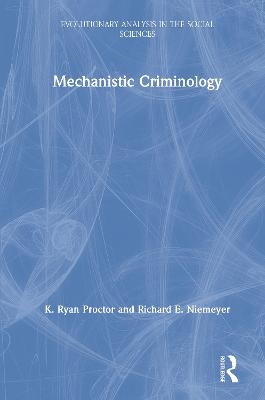
Mechanistic Criminology
Routledge (Verlag)
978-1-138-34255-2 (ISBN)
Mechanistic Criminology advocates for the adoption of a mechanistic mode of theorizing to allow criminologists to engage in theory falsification and competition and ignite rapid scientific discovery in the field. The proposed method is the same one employed within the biological sciences, which is responsible for their rapid scientific progress in the late twentieth and early twenty-first centuries. Should criminologists adopt this mechanistic approach, criminology could experience the same scientific revolution that is occurring in the biological sciences, and criminologists would generate the knowledge necessary for the prediction, explanation, and control of crime.
K. Ryan Proctor is Associate Professor of Sociology and Criminology at Avila University. His current research focuses on the development and application of theoretical methods to promote scientific progress within the social sciences, as well as understanding how technological advances alter social structures in ways that facilitate or inhibit crime. Richard E. Niemeyer is a co-founder and former Deputy Director of the Institute for the Applications of Mathematics and Integrated Science at the University of California, Riverside. His research broadly focuses on increasing systemicity between mathematics, the life sciences, and the social sciences. He currently lives in Denver, Colorado.
Part I: Scientific Criminology. Chapter 1: What is Science? Chapter 2: Assessing the Properties of Scientific Criminology. Chapter 3: Progress within Scientific Fields. Chapter 4: Scientific Progress In Criminology. Part II: Mechanistic Science. Chapter 5: Mechanistic Explanations. Chapter 6: Mechanism Schemas. Chapter 7: Biosocial Criminology. Chapter 8: Analytical Criminology. Part III: Mechanistic Translations of Criminological Theories. Chapter 9: Social Learning Theory. Chapter 10: Social Control Theory. Chapter 11: General Strain Theory. Part IV: Mechanistic Criminology. Chapter 12: Nondeclarative Memory. Chapter 13: Declarative Memory. Chapter 14: Theory of Mind. Chapter 15: Conclusion.
| Erscheinungsdatum | 11.06.2019 |
|---|---|
| Reihe/Serie | Evolutionary Analysis in the Social Sciences |
| Zusatzinfo | 7 Tables, black and white; 28 Line drawings, black and white; 14 Halftones, black and white |
| Verlagsort | London |
| Sprache | englisch |
| Maße | 152 x 229 mm |
| Gewicht | 680 g |
| Themenwelt | Recht / Steuern ► Strafrecht ► Kriminologie |
| Sozialwissenschaften ► Soziologie ► Allgemeines / Lexika | |
| ISBN-10 | 1-138-34255-6 / 1138342556 |
| ISBN-13 | 978-1-138-34255-2 / 9781138342552 |
| Zustand | Neuware |
| Haben Sie eine Frage zum Produkt? |
aus dem Bereich


